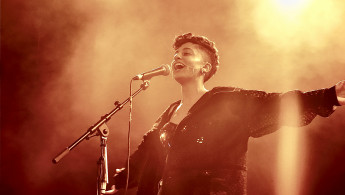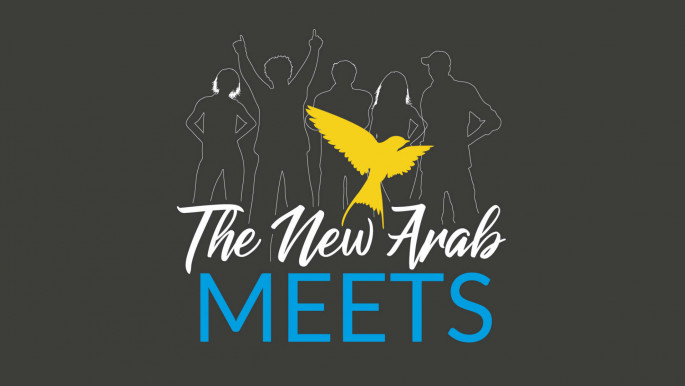Creating her own world: How Juliana Yazbeck is modernising traditional Arabic sounds with politically-conscious lyrics
For Juliana Yazbeck, writing and recording music for her debut album Sungod was an empowering experience.
It's hard not to notice the unapologetic pride in her Lebanese roots infused in her collection of songs, performed in a mix of English and Arabic. Even the title is a nod to Lebanon's ancient pre-Abrahamic heritage, when spirituality centred around Baal, the sun god.
Using a mix of Western and Arabian string arrangements and beats, and vocals that blur the lines between the Levant and the West, Yazbeck's songs flip from melodic to spoken and tackle themes of cultural identity, empowerment, decolonisation and gender inequality, with powerful lyrics likes: 'Before the white roses were planted, our trees had never bled'.
The latter theme in particular gave Sungod – released almost two years ago – a fresh boost in the advent of the Lebanese revolution, where women continue to be at the forefront.
Read also: 'The revolution is female': Why feminist issues are driving Lebanon's protests
"When the uprising started in mid-October, this absolutely badass, gobsmacking transgender Lebanese model and performer Sasha Elijah shared my song Alihat on social media in the context of the uprising and powerful women and herself being a powerful woman," Yazbeck recalled.
"It was such a highlight as I'm such a fan of hers – the song just had this whole new life which I hadn't found.
"You don't expect songs to pick up in certain contexts, but if I may say so about my own music, strong art is going to be relevant in every context."
 |
|
| Like many Lebanese, Juliana Yazbeck was raised bilingual [Instagram] |
Music has been at the epicentre of Yazbeck's life – whether it be in New Jersey where she spent the first five and a half years of her life, or in Beirut, where she was raised and educated when her family returned shortly after the Lebanese Civil War ended in the early 1990s.
She had her first piano lesson when she was five, and her household was known to play Tchaikovsky, Mozart, Chopin alongside Arabian greats Oum Kalthoum, Fairuz, Asmahan, Sabah and Abdel Halim Hafez.
After graduating with a fine arts degree from the American University of Beirut, Yazbeck completed a master's in performance making at Goldsmiths in London – the city she has called home for much of the last decade.
Like many Lebanese, she was raised bilingual, and this coupled with her life as part the global diaspora along with years of dabbling in music and writing left a mark on Sungod.
"For a long time, I felt like I didn't fit in either world. It was almost like, 'you don't have the right to make Arabic folk pop music' but on the other hand, 'you're not Western enough' because I largely grew up in Beirut," Yazbeck told The New Arab.
"But at some point, I was like, 'why are you fighting? This is glorious, it's new, it's fresh'. I made the music that I really needed and wanted to hear but couldn't find anywhere.
"I don't think I could write differently, and if I tried it would be quite forced."
 |
For a long time, I felt like I didn't fit in either world. It was almost like, 'you don't have the right to make Arabic folk pop music' but on the other hand, 'you're not Western enough' because I largely grew up in Beirut |  |
Since the launch of Sungod, Yazbeck has joined the growing list of independent music acts from the Arab world and diaspora known for going against grain of mainstream Arabic pop music with politically charged or socially conscious lyrics, or for simply modernising traditional sounds.
This wave of musicians includes the likes of Adonis, Lowkey, 47Soul, Cairokee and of course, Mashrou Leila – whom Yazbeck remembers performing on campus while they studied at American University of Beirut.
However, she shied away from acknowledging she was part of that wave, pointing to her multicultural upbringing and bilingual songs as reasons.
"I admire and I'm such a big fan of all of them," she said.
"It's so inspiring and heartwarming to see passionate art and to see LGBT and feminist acts at the forefront."
She added: "I mean, I would be honoured to be considered part of that wave. I don't know they have to tell me – like, can I be in your cool club? [laughs]"
Despite this, Yazbeck has become a familiar face on the Arab arts scene in the UK. Last year alone, she performed at both the Liverpool Arab Arts Festival and London's Shubbak Festival, and was a nominee for the Arab British Centre Award for Culture.
She has also performed various other festivals and standalone shows and on March 1, she will be the supporting act for Cairokee at the iconic Electronic Ballroom in Camden, North London.
"To do Electric Ballroom within two years of launching my music career is fantastic and so exciting, I have a thirst to do that calibre of venue," Yazbeck said.
"And to perform for Cairokee – their music is very powerful. They've been around for a long time and these guys are determined to make a difference with what they stand for politically, socially, on a human level."
Yazbeck went on to express ambitions to perform in Lebanon and across the Arab world – but she wants to make sure she can do it justice.
"I would absolutely – I mean, in a heartbeat – I would go and do it if it's the best show I can offer," she said.
Despite this, Yazbeck said her ultimate goal was to ensure that her freedom and achievements as an artist would give permission and space for future generations – especially Arab women musicians – to do much more. For that reason, the practice of providing space and uplifting artists from diverse backgrounds has become a passion for her.
 |
Yazbeck said her ultimate goal was to ensure that her freedom and achievements as an artist would give permission and space for future generations – especially Arab women musicians |  |
Indeed, when one listens to Sungod it becomes apparent that the singer-songwriter doesn't go out of her way to translate the Arabic lyrics that feature in many of her songs.
While she conceded it's not a decision she's entirely at peace with – citing the struggle of translating Arabic lyrics into English because of the former's inherently more poetic and complex nature – she makes no apologies for it.
"I know there are people from multiple diasporas or multicultural backgrounds who are not Arabic speakers and who would really love to hear these messages and know what I'm talking about," Yazbeck explained.
"But nobody translated the greats for us or for our parents – there's just this assumption that this is for these people and everybody else has to live with it.
"So it felt powerful to claim that space and to say like, 'this is for us'."
She added: "We Arabs all have the experience of having music, having rhythm and having language in our blood, literally in our DNA – it's a beautiful and powerful gift and I wanted to keep that sacred space.
"Everyone is welcome to come and participate – but I don't have to extend myself to you. And that felt pretty good."
Juliana Yazbeck will perform live at the Electronic Ballroom in Camden, London on Sunday, March 1. Click here for info & tickets. Sungod is also available on Spotify.
Elias Jahshan is freelance writer based in London. He is a contributor to Arab, Australian, Other: Stories on Race & Identity, out now through Picador.
Follow him on Twitter: @Elias_Jahshan
Read more from The New Arab Meets special section below:




